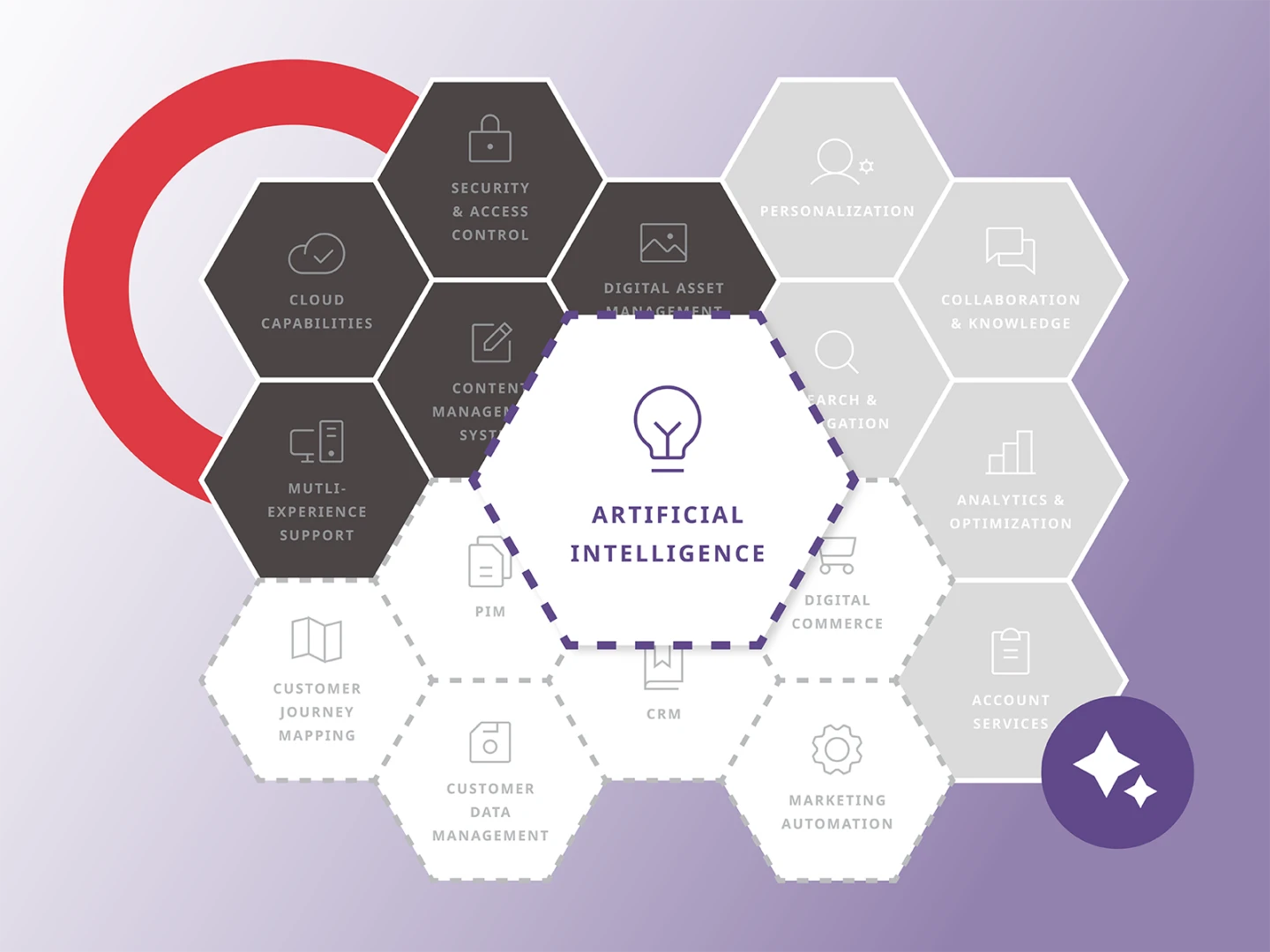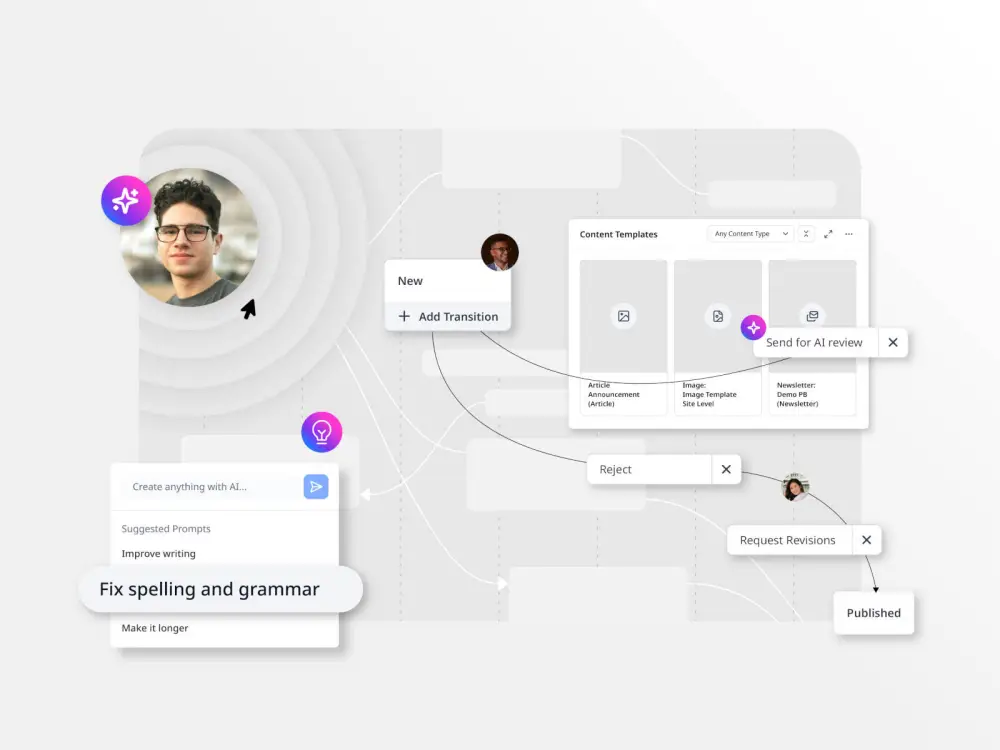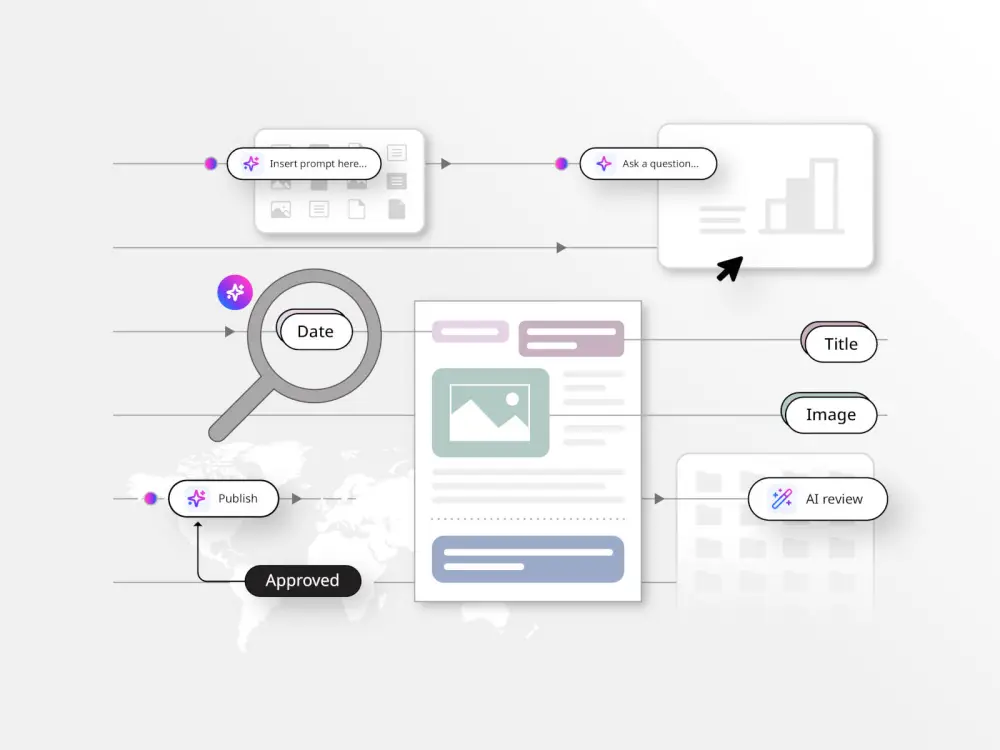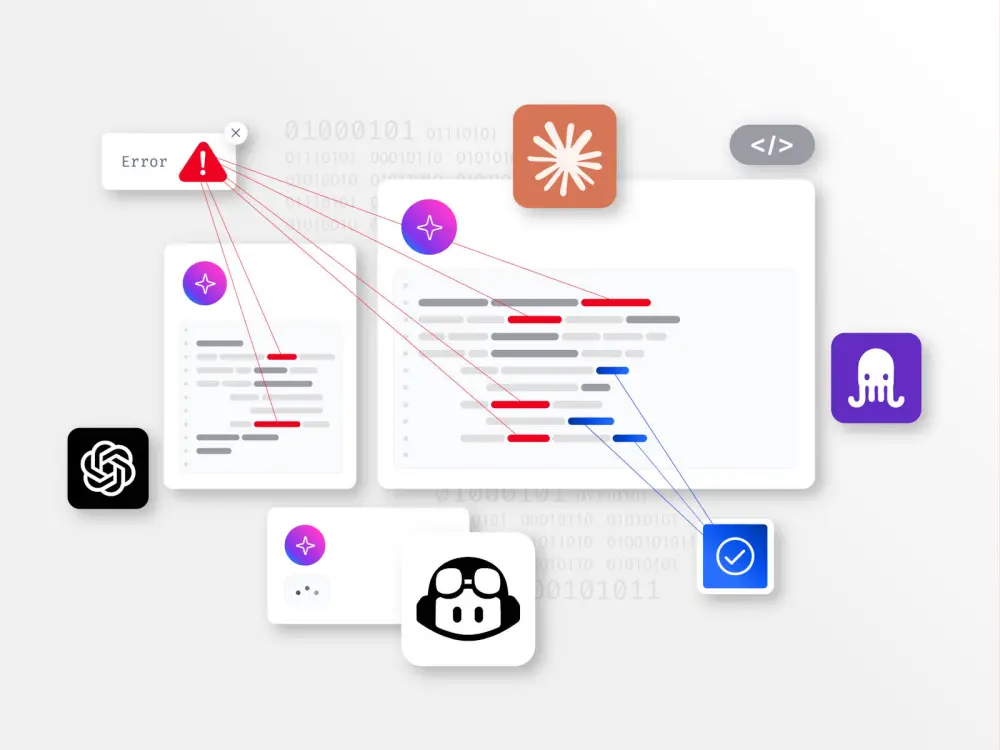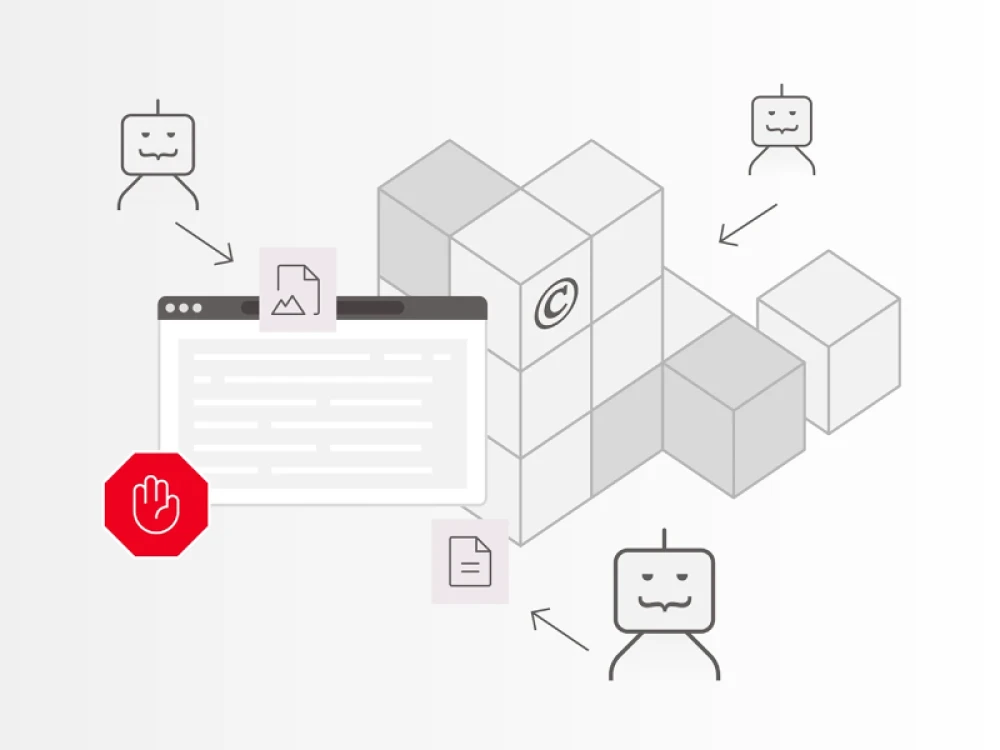On the surface, a digital experience platform (DXP) is exactly what it sounds like—an integrated set of technologies designed to enable companies to compose, deliver, manage and optimize digital experiences for their customers. It’s somewhat similar to a CMS, but built for omnichannel delivery and dozens of customer journey touchpoints.
Modern DXPs have several advantages over their predecessors and CMS counterparts. Perhaps the most significant developments, though, are the integration of data capture, analytics and AI/machine learning capabilities.
What is artificial intelligence and machine learning?
Before we dive into how they apply to DXPs, let’s clarify what artificial intelligence (AI) and machine learning (ML) are.
Artificial intelligence is a broad term that refers to a computer’s ability to imitate human-like intelligence and decision-making processes. It involves applying logic-based algorithms to interpret and respond to data inputs in a way that mimics human reasoning.
When you tell a chatbot what you’re looking for help with on a website, AI is what makes it possible to understand your request and provide an appropriate response. If you’ve ever gone online shopping and seen “You may also like... " recommendations, that’s also AI at work.
Machine learning is a subset of AI that focuses on training algorithms to learn from data. It involves feeding large amounts of data into an algorithm and allowing it to improve its performance over time by identifying patterns, trends and insights. This allows the algorithm to make predictions or decisions without explicit instructions.
Facial recognition is a solid example. When you unlock your phone by looking into the front camera, its software immediately verifies you by comparing and analyzing your facial contours with a stored set of data. The more you use ML, the better it becomes.
How DXPs use AI and machine learning to improve customer experiences
A digital experience platform is, by nature, data-driven. It’s built on APIs. And it’s designed to collect, analyze and act upon customer data to create personalized, seamless experiences across all your touchpoints.
To achieve this level of personalization and optimization, DXPs need to be capable of processing vast amounts of data in real-time. That’s where AI and ML come into play.
Here are a few specific use cases where AI and ML can enhance DXPs:
Generative AI
Generative AI leverages machine learning models to produce entirely new content based on existing data inputs.
In your DXP, this can include:
- Content generation
- Creative designs
- Web layouts and UI/UX elements
- Natural language processing
- Dynamic, personalized recommendations
- Sentiment analysis
- User behavior predictions
You can use generative AI to help you write web content in your content management system, add meta tags in digital asset management systems and deliver multilingual support to global customers.
Cognitive search
Cognitive search is a subset of AI that allows your DXP to understand the meaning behind data inputs, rather than just retrieving results based on keywords. It combines natural language processing (NLP), machine learning and other AI techniques to deliver more accurate and relevant results.
In a DXP, cognitive search can be used for:
- Automatically tagging content with relevant metadata
- Enhancing search functionality for more accurate and personalized results
- Providing recommendations based on search history, behavior and preferences
By analyzing context, user intent and semantics, your DXP can facilitate conversational and multilingual search, intelligent filtering and better content discovery—all things that ultimately improve customer engagement (and, by extension, your conversion rate).
Predictive analytics
Perhaps one of the broadest applications of AI in DXPs, predictive analytics uses machine learning algorithms to analyze past data and make predictions about future outcomes. This can include predicting patterns in customer behavior, identifying trend insights and improving decision-making processes.
In a DXP, predictive analytics can help with:
- Marketing campaigns (optimizing messaging, targeting and channel selection)
- User experience (UX improvements based on user behavior and preferences)
- Sales forecasting (churn forecasting, identifying upsell/cross-sell opportunities)
- Segmentation and targeting (based on monetary values, NPS and emotional responses)
Within your DXP, predictive analytics helps you create better content and optimize the overall digital experience for your customers. It also enables you to take a proactive approach to preventing lost sales and revenue.
Sentiment analysis
Social media and reviews are a goldmine of information as far as your products, services and experiences are concerned. When someone posts about you, sentiment analysis uses text analytics and NLP algorithms to classify the sentiment as positive, negative or neutral.
As an example, it can parse through hundreds (or thousands) of reviews to determine whether customers are happy with your product’s price and quality.
You can also use sentiment analysis to get a better idea of what customers expect from you. If they continuously post on social media about a particular pain point, there’s your opportunity to make a meaningful change.
System integration
A huge advantage DXPs have over any other system is they’re designed to be the central point of communication between all your applications and tools. They’re literally built to play nice with others.
If you use a composable DXP like Brightspot, AI integrations for everything from recommendations and auto-tagging to content creation and governance are remarkably seamless.
The benefits of AI in content management and analytics
In today’s world, “not having enough data” is no longer the problem. It’s being able to act on it.
With AI and machine learning, you can use your DXP to:
- Get a holistic view of every customer
- Fully understand the customer journey
- Attract new customers, retain existing ones and boost lifetime value
- Create content faster without sacrificing quality
- Personalize content, offers and experiences at scale
- Make better decisions about where to spend your marketing budget
- Optimize internal workflows
AI also allows you to collect and analyze data that humans simply couldn’t. This means you can uncover hidden patterns, identify new opportunities and improve your overall understanding of customer behavior.
What the future holds for AI and digital experience platforms
The typical customer journey can have anywhere from 20 to 500+ touchpoints. And no two customers follow the same path.
As today’s customers continue to expect more personalized and seamless experiences, technology will continue to evolve to meet those demands. We’ll continue to see more and more of the following, as we’ll see it all fit together seamlessly:
- Targeted search and discovery
- Personalization and tailored experiences
- Automated content creation and curation
- Behavioral analysis and predictive modeling
- Multi-channel, multi-device optimization
Staying ahead with AI-powered DXPs
You’ve been hearing about AI for years. At the very least, it’s been at the tip of your tongue since ChatGPT’s massive November 2022 launch.
But you aren’t late to the party by any means.
A Forbes Advisor survey of 600 American business owners found that businesses use AI for everything from customer service to cybersecurity and supply chain ops. 97% of them believe it will help their business, and more than half plan to use it for instant messaging, emails and personalized services.
Still, only 35% of global companies say they’re currently using AI (though an additional 42% say they plan to). And the ones that are generally use basic tools and microservices.
A DXP is much different. They integrate a wide range of AI tools, including natural language processing, predictive analytics and machine learning.
So, if you’re reading this and interested, you’re ahead.
Request a demo to see how Brightspot can transform your content management and analytical capabilities.

